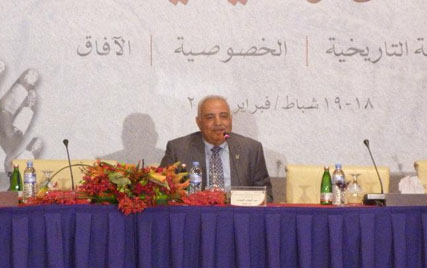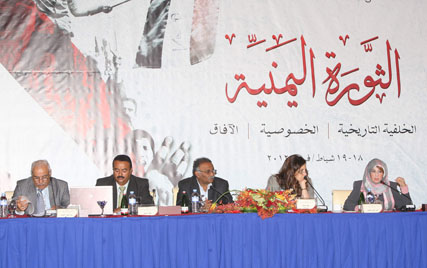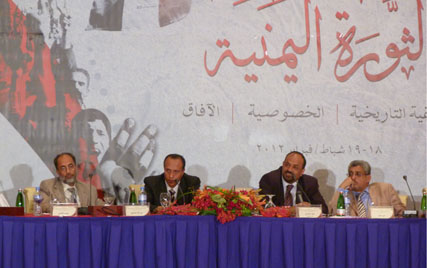
The Arab Center for Research and Policy Studies hosted a two-day Symposium addressing a variety of issues related to the unfolding Yemeni revolution. The meeting to be held over one and a half days in Doha's Sheraton Hotel, saw participants and invited speakers coming arriving from Yemen itself, from Egypt, the United Arab Emirates as well as Qatar.
Speakers during the first day of the meeting discussed issues related to the history, politics and economics of the Southern Arabian state; almost by stealth, the question of unity between North and South Yemen-the two countries were reunited in 1991-imposed itself on the deliberations. The first session was opened by ACRPS Researcher Dr Abdulwahhab Qassab, who mentioned how "Yemen was present in every Arab country; in the bloodlines of their people", referring to the Yemeni descent of which many Arabs in North Africa and the Gulf were very proud.

Yemeni philosopher Qaderi Haidar, who recently launched a Yemeni academic journal, spoke of the complex relationship between the Yemeni people and their history, mentioning the often deleterious effects of Western orientalist writing on the Yemenis' self-perception. "We create history, we create this series of taboos, and these social structures, and then they come to dominate us", said Haidar, pointing out how Yemenis' perceptions of their own tribalism was something which they then imposed on themselves, standing in the way of their own development. Haidar went on to speak of the specificities of Yemen, but was at pains to point out how much of what people believed about Yemen was misconstrued: Yemen was not the Arabian Peninsula's Wild Southwest; it was not a country where every second person owned a gun, but rather a dynamic society aiming to improve its political structures. Dr Fouad Salahi went on to flesh out this statement with more details, explaining how the Yemeni people have been party to no fewer than four popular revolutions in the past 100 years. This was followed by a lively question-and-answer session, with a number of audience members, Yemenis and non-Yemenis alike, taking issue with what seemed to be a separatist streak in the speech by Salahi.

Although the second session was opened by Dr Nivene Massad with a comment about how good it was to finally see two women on a panel-she was joined by the Yemeni Dr Huda Alawi-the conversation quickly turned back to the one of separatism on the part of South Yemenis. In Alawi's words, "we can now see that the decision to unify the two Yemens was probably made in haste".
The closing session was devoted to a discussion to some of the economic factors which affect Yemen's development. Dr Abdullah Al Adi, addressing the structure of Yemen's economy and the obstacles to the progress of Yemen's economy, managed to project a sense of optimism despite the grim reality on the ground. Discussing statistics on the widespread illiteracy and unemployment within Yemen, which he had sourced from the Yemeni Ministry of Planning and International Cooperation, Al Adi pointed out areas where future investment and better governance by the Yemeni authorities were likely to have quick results; in fact, the numbers from the Yemeni government seemed to indicate that.

While the discussants in the audience and on the platform seemed to show a wide spectrum of opinions on most matters, one matter seemed to be settled by the Qatari commentator and attendee at the meeting, Mohammed Misfer: "It would be a great tragedy for us to divide ourselves into confederations in the present context; Europe, which is divided by a score of languages, is being brought closer together", a simple statement about the need to avoid the possibility of re-dividing Yemen into two separate states, but one which was warmly received by a wide majority of the attendees. The Symposium would continue for a half-day of deliberations focused on societal issues impacting Yemen on Sunday, 19 February, followed by a roundtable discussion led by ACRPS General Director Dr Azmi Bishara to close the day.